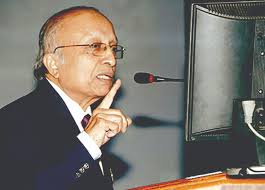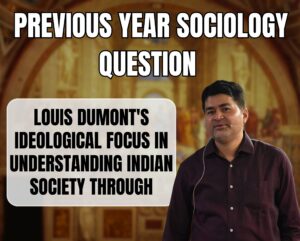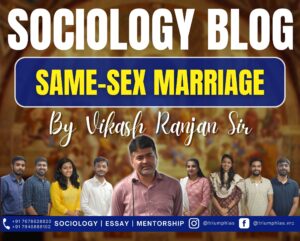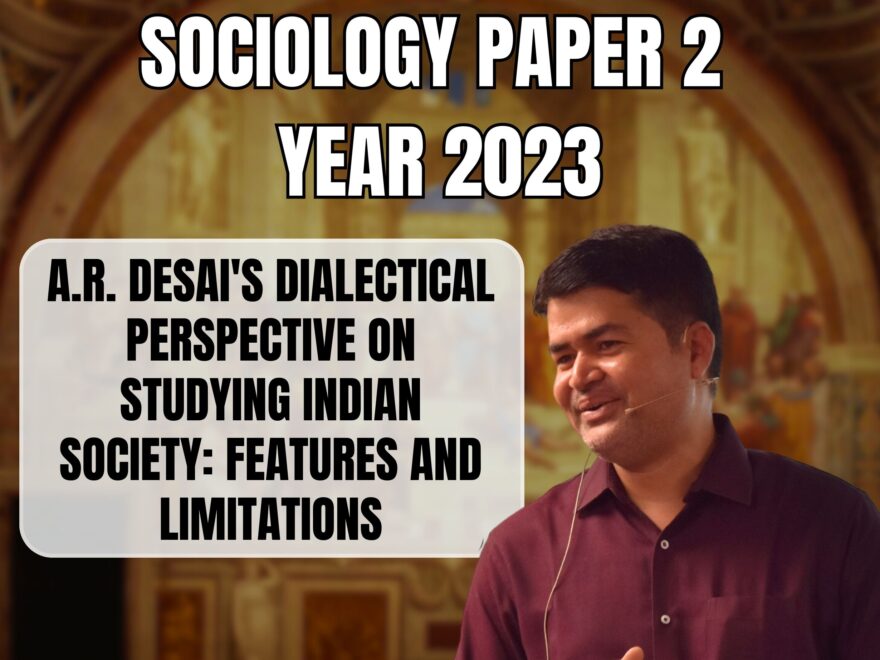Highlight the significant features of A. R. Desai’s ‘Dialectical Perspective’ to study Indian Society.
Section: A
Sociology Paper 2023 Analysis
[Paper 2: Unit-12 Perspectives on the study of Indian society; Marxist sociology (A. R. Desai)]

Question: 1 (a) “Highlight the significant features of A. R. Desai’s ‘Dialectical Perspective’ to study Indian Society.
(10 Marks)
|
Introduction: Brief Idea About A R Desai’s Dialectical Materialism Main Body: Significant Features of Dialectical Perspective of A R Desai to Study Society, Limitation of Applying The Dialectical Perspective Conclusion: Conclusion: Highlighting The Relevance of Dialectical Approach to Indian Sociological Tradition |
Introduction:
- A. R. DESAI applied Marxist approach to study Indian society. He used dialectical historical model to study Indian society. He rejects any interpretations of tradition with reference to religion, rituals and festivities. Desai framed an interdisciplinary sociology and used the method of participant observation and fieldwork to understand Indian social structure and capture the processes of change.
Main body:
Significant Features of Dialectical Perspective of A R Desai To Study Society
- Nature of society: A.R. DESAI says Indian society went from feudal economy to capitalist economy due to the British conquest of India. The introduction of economic reforms of the British government disrupted the old economic systems. The village commune was replaced by modern peasants proprietors or zamindars, as private owners of land.
- Agrarian class structure : According to DESAI Indian agrarian class structure changed to capitalist form , where multiple classes existed due to commercialization of agriculture , fragmentation of land resulted in growing polarization of classes in agrarian areas, poverty in rural areas and exploitation by the owner of land.
- Tradition: Desai rejected any interpretation of tradition with reference to religion, rituals and festivities. It is essentially a secular phenomenon. Its nature is economic and it originates and develops in economics.
- Transformation of Indian Society: Desai does not deny the necessity of understanding the institution like caste, religion, linguistic or tribal groups or even specific cultural traditions which are characteristics of Indian society. He however supports the endeavors to understand their role in and the nature of their transformation in the larger context of the type of society , which is being evolved , understand them in the matrix of underlying overall property relations and norms implicit therein, which pervasively influence the entire social economic formation.
- Peasant struggle: He examines peasant struggle in two volumes entitled “PEASANT STRUGGLES IN INDIA” and “PEASANT STRUGGLES IN INDIA AFTER INDEPENDENCE”. He analyze the struggle before independence and post-independence by highlighting the difference in character of struggle by saying that agrarian struggle in present is war wage by the newly emerged propertied class as well as agrarian poor , especially agrarain proletariat.
- The propertied class fight for greater share in the fruits of development. The poor comprising pauperized peasants and laborers belonging to low caste and tribal communities struggle for survival and for better life for themselves. Thus Desai maintained that progress can be achieved only by radically transforming the exploitative capitalist system in India.
- State and society: in “STATE AND SOCIETY IN INDIA” Desai provided a critique of the theories of modernisation accepted by large number of academic establishments. He says modernisationn serves as a valuable ideological vehicle to ruling class pursuing the capitalistic path. In an essay “THE MYTH OF THE WELFARE STATE” Desai provided a detailed picture critique of notion. According to him an ideal welfare state has three core features:
-
- It is democratic
- It is mixed economy
- It is positive state rather then being lazzie faire state
But according to him state has failed to remove poverty, reduce income gaps eliminate social discrimination check the capitalistic greed and provide employment to all.
- Village: according to Desai village was historically evolved much before pre British era and the village as a social unit was a relatively self-sufficient unit in economic dimension. It never had considerable exchange reaction with outside world and relation within village was feudal in nature. He saw JAJAMANI system as exploitative one. However introduction of land revenue system introduced by Britishers led to capitalist mode of production in village.
- Urban society: in urban society there is also capitalist industrial working class, petty traders, and professional class like doctors, lawyers and engineers.
- Caste: Desai thinks that when tradition is linked with economic relations, the change in economy would eventually change the traditions. According to him caste inherits an underdeveloped but potential class character. It is in this context that he thinks that caste will disintegrate with the creation of new social and material conditions, such as industries, economic growth, education etc. He even sees reservation as deliberate attempt of state to glorify the segmentation of society.
- Contradictions in Indian Society and Social Unrest:Emerging contradictions in India’s social transformation stem primarily from the growing nexus among capitalists, rural petty bourgeoisie, and the state apparatus, all originating from similar roots. This nexus hinders the aspirations of rural and industrial working classes through its power and strategic maneuvers. These contradictions persist, evolving into new cumulative forms and reemerging as protests and social movements. Social unrest finds its roots in India’s adoption of a capitalist path, inheriting this legacy from the national movement.
Limitations of ‘Dialectical Perspective’ to study Indian society
- Desai’s approach for understanding Indian Society from the economic dimension is not always the best way to understand the society.
- Desai’s approach of understanding Indian Society is not empirical based. According to YOGENDRA SINGH the important limitation of dialectical perspective applied by Desai for studies of social change in India is lack of substantial empirical data in support of his major assertions, which are often historiographical and can easily be challenged.
- In a bid to give importance to material aspects, it ignored the importance of religion and culture in the lives of people of India. Religion occupies an important place in Indian society and world view of people is influenced by it. This perspective is not capable of portraying a total view of social reality in India and takes only a materialistic view.
- Another deficiency is ignoring caste as the basis of traditional Hindu social organization. Caste was often equated with class which generated an over-simplistic view of the pattern of social inequalities.
- Over emphasis upon conflict led them to overlook aspects of integration and solidarity of Indian society. For example, institutions like Jajmani system and panchayats were also seen as exploitative.
Conclusion:
In theoretical terms however , dialectical approach can be more visible for analysis of the processes of change and conflict in India provided it is founded upon sound tradition of scientific research. Despite this limitation some studies conducted on this model offer useful hypothesis, which can be further tested in course of the studies on social change.
Related Blogs…
 |
 |

To master these intricacies and fare well in the Sociology Optional Syllabus, aspiring sociologists might benefit from guidance by the Best Sociology Optional Teacher and participation in the Best Sociology Optional Coaching. These avenues provide comprehensive assistance, ensuring a solid understanding of sociology’s diverse methodologies and techniques.
META TAGS:
A.R. Desai, dialectical perspective, Indian society, capitalism, agrarian class structure, peasant struggles, tradition, transformation, state and society, caste, contradictions, social unrest, limitations, empirical data, religion, culture, Jajmani system, panchayats, social change.
Why Vikash Ranjan’s Classes for Sociology?
Proper guidance and assistance are required to learn the skill of interlinking current happenings with the conventional topics. VIKASH RANJAN SIR at TRIUMPH IAS guides students according to the Recent Trends of UPSC, making him the Best Sociology Teacher for Sociology Optional UPSC.
At Triumph IAS, the Best Sociology Optional Coaching platform, we not only provide the best study material and applied classes for Sociology for IAS but also conduct regular assignments and class tests to assess candidates’ writing skills and understanding of the subject.
Choose The Best Sociology Optional Teacher for IAS Preparation?
At the beginning of the journey for Civil Services Examination preparation, many students face a pivotal decision – selecting their optional subject. Questions such as “which optional subject is the best?” and “which optional subject is the most scoring?” frequently come to mind. Choosing the right optional subject, like choosing the best sociology optional teacher, is a subjective yet vital step that requires a thoughtful decision based on facts. A misstep in this crucial decision can indeed prove disastrous.
Ever since the exam pattern was revamped in 2013, the UPSC has eliminated the need for a second optional subject. Now, candidates have to choose only one optional subject for the UPSC Mains, which has two papers of 250 marks each. One of the compelling choices for many has been the sociology optional. However, it’s strongly advised to decide on your optional subject for mains well ahead of time to get sufficient time to complete the syllabus. After all, most students score similarly in General Studies Papers; it’s the score in the optional subject & essay that contributes significantly to the final selection.
“A sound strategy does not rely solely on the popular
Opinion of toppers or famous YouTubers cum teachers.”
It requires understanding one’s ability, interest, and the relevance of the subject, not just for the exam but also for life in general. Hence, when selecting the best sociology teacher, one must consider the usefulness of sociology optional coaching in General Studies, Essay, and Personality Test.
The choice of the optional subject should be based on objective criteria, such as the nature, scope, and size of the syllabus, uniformity and stability in the question pattern, relevance of the syllabic content in daily life in society, and the availability of study material and guidance. For example, choosing the best sociology optional coaching can ensure access to top-quality study materials and experienced teachers. Always remember, the approach of the UPSC optional subject differs from your academic studies of subjects. Therefore, before settling for sociology optional, you need to analyze the syllabus, previous years’ pattern, subject requirements (be it ideal, visionary, numerical, conceptual theoretical), and your comfort level with the subject.
This decision marks a critical point in your UPSC – CSE journey, potentially determining your success in a career in IAS/Civil Services. Therefore, it’s crucial to choose wisely, whether it’s the optional subject or the best sociology optional teacher. Always base your decision on accurate facts, and never let your emotional biases guide your choices. After all, the search for the best sociology optional coaching is about finding the perfect fit for your unique academic needs and aspirations.
Follow us :
🔎 https://www.instagram.com/triumphias
🔎https://www.youtube.com/c/TriumphIAS
https://t.me/VikashRanjanSociology
Find More Blogs…
| Compare and contrast Karl Marx’s and Max weber’s | Karl Marx- Historical Materialism |
| Talcott Parsons : Social system | Scope of the subject and comparison with other social sciences |


One comment